| FEATURE RACE COMMENT |
YEAR: 1992
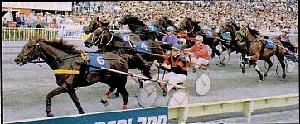 |
| Staka Pride winning the Air NZ FFA on Show Day |
It was Show Day for the mares at Addington. Blossom Lady, Pay Me Back led the charge, and Staka Pride set a record, taking 0.3 seconds off Glenfield Girl's mobile 2600m for a trotting mare in winning the Air New Zealand National Trotting Free-For-All in 3:18.7.
Staka Pride had finished third after a promotion on Cup Day, getting through quickly from the second line to trail. She didn't finish with any punch but held her ground. This time as usual, she flew out of the gate, led, and saved herself in the trail when passed by Hickory Stick near the 1800 metres. This time, she had a real kick at the finish when the gap came along the rail, forging through, racing ahead, and winning by a length.
The improvement was pretty much expected by driver Leo O'Reilly, whose previous biggest win was the 4-year-old championships at Forbury Park with Regal Maina, and her Waimate trainer Keith Coutts. "She goes much better with her races close together," said Leo, the regular driver this past year, taking over from Allister Scott, now in Australia. "We wanted to pick on a young driver and one we could help," said Keith, who races the hardy Stakhanovite mare with his wife Lorraine. "What we liked about Leo is that he is very patient, and you can come away still with a horse for another day," he said.
Leo, aged 30, has won three behind her. He has a team of 12 in work at Rakaia, headed by the capable Innovate. Others he expects to make the grade a Payson's Brother 3-year-old filly, a Noodlum half-sister to c1 pacer Stater, and a Fitch II half-sister to Innovate.
Coutts has four in work, including Staka Pride's 5-year-old brother, Reddington. Staka Pride was bred by National Bloodstock, and Coutts, who stood Stakhanovite at the stud, raced her on lease until he exercised his right of purchase after her 2:04 mile win at Ashburton as a 3-year-old. Staka Pride had been winning at an average of $1000 per start but her $21,875 prize has now put her past the $100,000 mark from 83 starts.
For Staka Pride to have a chance of winning Saturday night's Dominion Handicap, her connections know she won't be able to rough it the way William Dee and Ceddie can. "As long as she doesn't have to do any work, she will be all right," said Keith.
Hickory Stick was a sound second, ahead of Rosie O'Grady, which raced on the outside line near the pace and stuck to it well. Ceddie was again the rugged customer, finishing fourth after sitting out wide in the open for the last lap. The favourite William Dee galloped at the start, but trotted to the satisfaction of trainer John Langdon once he settled, and Game Paul ran 13th, putting in his best work when it was as good as over.
Credit: Mikr Grainger writing in HRWeekly 18Nov92
YEAR: 1992
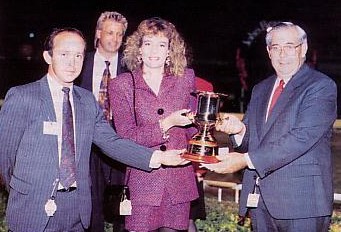 |
| Katrina Purdon receives the Derby trophy |
Kiwi Scooter was rugged the winner of the $150,000 John Brandon 30 New Zealand Derby. Australian visitor Lotsnlots again found the Roy and Barry Purdon - trained gelding superior but ran gamely for second, and the filly Tigerish put up a run that would have won 99 out of 100 races for a gaining third.
The 3:13.6 for the mobile 2600 was the third fastest Derby run - behind Master Musician's 3:13.5 and Winning Blue Chip's 3:12.2 - which was the type of race Kiwi Scooter wanted. Barry Purdon has always promoted staying power as Kiwi Scooter's best weapon and the hectic pace set by Clever Legend and Jimmy Curtin could not have suited him more.
While not the quickest out, the son of Direct Scooter left the gate at good speed and kept handy for the first 400 metres. Some early sprints, including a blinder from Lotsnlots near the 1900 metres, forced him back in the field, and near the 1400m Purdon decided to employ the grinding tactics that worked so well in his win the previous week. "He can get out of the gate quick, but it seems better to settle him. He doesn't run out of gas that way," said Barry. On the corner as Lotsnlots tried to apprehend him, Kiwi Scooter pulled away, and went on to win in very convincing fashion.
Tigerish, all class, came from far back for a close third to win $15,000 and Harmers Choice, while looking an unlucky fourth was apparently not because driver David Butcher said he doubted whether the horse was capable of finishing any closer. Master Blaster a worthy third on the middle night, was taken back from the gate at the start, and was never in the hunt afterwards.
Kiwi Scooter was not an easy horse to handle early in his career, though Barry did not connect it with the fact he had one testicle. "I thought he was a rig. When his other testicle came down, his attitude seemed to improve," he said.
Kiwi Scooter, now starting a spell from racing, is on c8, the same mark as Tigerish. Barry said it was "ridiculous" that after just two seasons of racing and about 20 starts each, both horses would go into open class racing. "It's tough on them. There should be a limit on how farthey can go at this age, say c7 for the colts and c6for a filly," he said.
Credit: Mike Grainger writing in HR Weekly
YEAR: 1992
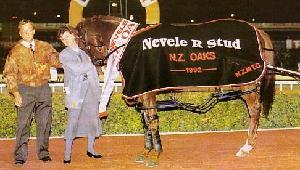 |
| Lindsay & Pam Turner pose with Oaks winner Tigerish |
Tigerish, the youngest in the field, and the only chestnut, had too many guns for Rarity and 12 others in the $45,000 Nevele R Stud New Zealand Oaks. Such was her dominance that she looks a good thing to extend her Autumn record at Addington by winning the $135,000 DB Draught Fillies Final, especially from an ideal spot on the front line of the gate.
There was no surprise about last week's result, even though Rarity narrowed the margin back with a lightning burst to a length at the end. Tigerish squandered a wide break half-way along the straight through her little habit of easing up when close to the wire. "She pulled up a bit on me," reported driver James Stormont later. "My plan was simply to follow Rarity out. Once I got to the front I thought I might have got attacked but 3:17 for the trip (2600m mobile) kept them busy," he said. Trainer Lindsay Turner wasn't surprised to see her dodge some of the workload when there was still a bit of business to do. "She will be as lazy as anything if you let her, and it's the same with her work at home," he said. The fastest for the race has been Adina Bebe's 3:16 set in 1989, and the only others under 3:17 have been Young Eden and Julie Vance.
Turner, aged 36, has spent most of his life in the retail industry, employed for 15 years in Australia by Coles-Myer, and more recently in New Zealand as sales manager for FDC in Manakau City. The ability of Tigerish to earn Lindsay and his wife Pam around $240,000 in 14 months has been one of the reasons he has left the shop counter and concentrated on handling horses. They now have two small properties at Pukekohe,one for the agistment of stock, and the other where they have built a new barn to prepare yearlings for sale and wean foals. One horse that won't be in the barn is Tigerish, which is entirely paddock-trained.
Safely through Saturday's classic, Tigerish - a $2,000 buy at the 1990 International Yearling Sale - will be booked on a suitable flight to Brisbane for the Queensland and Australian Derbies, both in July. In the Oaks, the second line draw posed no problems for Tigerish, though it did for Pay Me Back, which broke and lost all chance when Delkedra - later relegated to fifth - upset her. This time she has drawn 11 but will start from the front - as will Pay Me Back - and wise heads won't be needed to reckon that Stormont will steer for the lead. If that is the case, and the others batten down the hatches, Smooth Performer's race record of 2:27.8 will be safe for another year. On Friday night Tigerish will have four fresh rivals against her: Kurahaupo Pride, Amenable, Nicola Mary and Tuapeka Dancer, which fill the places left by Kinski, Chicaboo, Lady's Day, Russley Fancy and Maude's Gift. Her main rivals, going on the Oaks form, will be Rarity and Cut The Cake, which suffered a hard run and took it well, and two Vance Hanover fillies that missed a start in the Oaks, Tuapeka Dancer and Kurahaupo Pride.
Credit: Mike Grainger writing in HR Weekly
YEAR: 1991
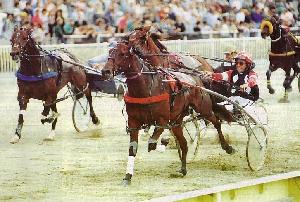 |
| Master Musician and Robert Dunn win the Derby |
Master Musician had to be the outstanding horse he is to resist the earnest efforts of Impressionist, Sogo and Tartan Clansman in the John Brandon 30 NZ Derby. And Stabilizer might have joined them, too, had David Butcher chosen to leave Mac Magpie's back in the early stages of the race rather than later, when the others were splitting up the prizes.
Impressionist was forced to work a little hard until he got to the lead at the 2000 metres. At that stage, Master Musician, who was able to follow Cadillac Jack forward, was fourth, trailing sweetly on the outer, and Tartan Clansman was behind him. Stabilizer, who was second at the 2300m, was four deep and 7th at the 2000m. Just as he did on the middle night, Robert Dunn put Master Musician into open country near the 750m. He joined the attack before the corner and fought his way clear. His pursuers weren't easy to shake off. Tartan Clansman tried hard to stick with him, Impressionist didn't submit without a fight, and Sogo emerged to battle past the pair right at the end and ran Master Musician to a short length.
It took Master Musician 3:13.5 to complete the mobile 2600m, and only Winning Blue Chip, who won the Derby last year in 3:12.2, has gone faster among those of his age. A son of New York Motoring, bought for $37,000 at the International Sale, Master Musician is raced by Ken McDonald and Eugene Storck, who are scrap metal dealers, and Dunn. Outside of his $500,000 won on bonuses, Master Musician has now earned $772,414, the result of 14 wins and a third from 16 starts.
As he did on the second night, Mr McDonald paid tribute to veterinarian Dr Peter Gillespie who has monitored the health of his young champion so carefully these past few weeks. Said Dunn: "He has a tie-up problem and he seems to pick up a virus so easily. The checks Peter has been able to give him have been vital."
Dunn, aged 36, said the win had been a great thrill, and rivalled that of National Glory in the Sires' Stakes Final. "We've really had so many over the last two or three years, it's hard to choose," he said.
Credit: Mike Grainger writing in HR Weekly
YEAR: 1991
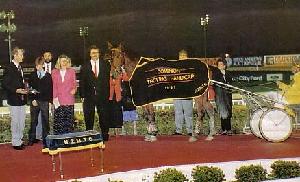 |
| The connections pose with William Dee. |
Having won a New Zealand Cup, an Auckland Cup, an Inter-Dominion Pacing Grand Final and an Inter-Dominion Trotting Grand Final, John Langdon had no summits to climb. The record book is not the best guide of such events, however, because Langdon knew he had another big one left. "One of my ambitions long before I started out in my training career was to win a Dominion Handicap. I have always loved trotters. It's a skilful job getting a trotter right. To win a Dominion, I feel I've really achieved something as a trainer," he said.
Langdon reached that special peak with William Dee, the Canterbury-bred 7-year-old son of 1979 Dominion Handicap winner Alias Armbro who raced like a Panzer tank and didn't stop for anyone. Langdon drove him hard, the way William Dee likes it. He was a little concerned racing over the first 800 metres that his charge wasn't as sharp as he should have felt, but further on he started to feel better. After being caught a little wide early, then pressed on and reached the front 1700m out, where they stayed, winning in the end by a length and a half from Gee Du Jour, who ran right up to her best form. The rain was a blessing too. Langdon at first believed William Dee was no great shakes on puggy or soft tracks, but as he does such a lot of his work at home on Langdon's sand track there were no alarms in the camp. "The rain came just at the right time. He was just starting to feel his feet a bit, and this made a bit of a difference," he said.
William Dee now races without the gear he had when Langdon first started training him. "He had a hood with pacifiers, a noseflap, and a brush as well. It worried me a little about the dirt coming back but it hasn't bothered him," he said.
Now the winner of 17 races from 58 starts, William Dee will be kept on a busy detail, with racing coming up at Thames, Auckland, Cambridge and Melbourne Inter-Dominions. William Dee was bought by Kevin O'Gorman, one of four partners in the horse, as a 3-year-old on the recommendation of Murray Lawson. Mr O'Gorman, a stalwart of the Marist senior forward pack for 13 years, had been a dabbler for 20 years, his first attempt being Pamela Queen, a pacer by Winterlight he had with Ray Morris. "I had odds and sods after that, but nothing of note until Idle Pride and William Dee," he said.
William Dee had raced once, on the West Coast as a 3-year-old when Mr O'Gorman bought a half share, but early opinion about the prospects of the relation to former top trotting mare Harbour Light were not encouraging. He was sent to Mankind Lodge, where veterinary surgeon Merv Williamson operated on a leg and made a start on his preparation. "When Jack Carmichael didn't take him, I sent him back to Bevan Heron and he won six races with him. It was when Idle Pride looked like winning as many - and Bevan thought 'Pride' was better - that I decided to send William Dee up to John Langdon's. I consider he has been underrated. He hasn't had the limelight some of the others have had," he said.
Credit: Mike Grainger writing in HR Weekly
YEAR: 1991
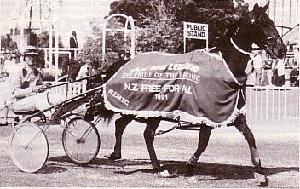 |
| Christopher Vance parades after the win |
Christopher Vance and Chokin gave Tony Herlihy further armchair drives as they followed up their NZ Cup and Sires' Stakes Final victories of three days earlier by accounting for the Air New Zealand Free-For-All and Coupland Bakeries Three-Year-Old Stakes with similar consummate ease.
Christopher Vance trailed The Bru Czar in the Free-For-All, Herlihy taking a calculated risk that the good Kumeu pacer would move out in the straight as he had noticed him doing in his races. It paid off. When The Bru Czar veered away from the hub rail in answering the game of the parked-out Surmo Way, Christopher Vance was quickly through on the inner and on to victory by a length in 2:26.8 for the mobile 2000m.
A 1:58.2 rate, this was nevertheless well outside Armalight's race and New Zealand mark of 2:23.5, established a decade ago. But, as with Chokin, Chrisopher Vance won with much in hand. It took his record to 41 starts, 20 wins, 10 seconds and 4 thirds for $843,720.
The Bru Czar held second by a nose from Surmo Way, with Clancy a strong finisher from the rear into fourth, a length and a quarter back.
Credit: Ron Bisman writing in HR Weekly
YEAR: 1991
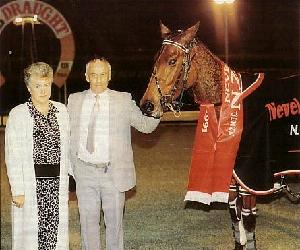 |
| Irene & Ollie Haines with Smooth Performer. |
Smooth Performer's front running win in the $45,000 Nevele R Stud New Zealand Oaks was good news for the Southland syndicate who bought her sire Top Performer for $32,000 at auction in March.
Top Performer (1:55.6US) is to stand at Henderson and Shelly Hunter's stud farm at Edendale next season. Top Performer stood in Canterbury last season after earlier being at the Kenwood Stud in Cambridge. Smooth Performer is from the first crop of the son of Niatross. She is owned by Harness Racing Conference executive member Ollie Haines and his wife Irene who bred her from Annie Smooth (3 wins)who had her race career cut short by injury.
In an action replay of the Great Northern Oaks finish, only with the placings reversed, Smooth Performer hung on to win by half a head from Smooth Gretna, who had trailed three back on the fence for Glen Wolfenden. The previous week she had got up to score by a short neck but David Butcher's strong drive on Smooth Performer got her home. He was able to dictate the pace with few
serious challengers and sprinted home in 57.8 with the overall time being 3:17.5, 1.6s outside Happy Hazel's national record.
The hot favourite, Seaswift Franco, was trapped three and four wide over the first lap and then sat parked, leaving Jack Smolenski cursing the outside barrier draw and the bad luck which has dogged him since Time's Up won 10 years ago. Her effort deserved a better fate and the rich DB Fillies Final might provide her connections with some compensation. The racing luck was with Smooth Performer in the Oaks, leaving her connections over the moon. Trainer John Butcher described her a natural from day one while Haines, the vice-president of the Cambridge Club, said it was easily his biggest thrill in racing. It was Smooth Performer's seventh win in 13 starts and took her earnings over $96,000.
The first three home were clear of their rivals although c2 horses Camara Vance, who trailed, and Silky Midas, running on well after being second last most of the journey, did well to run fourth and fifth ahead of Alamidas who battled in the run home after improving wide the last lap.
Credit: Gary Birkett writing in HR Weekly
YEAR: 1991
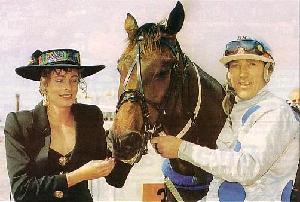 |
| Katrina Purdon, Chrisopher Vance & Tony Herlihy |
Christopher Vance won the 1991 DB Draught NZ Cup with a surprisingly good race that simply reflected the big-race temperament and experience of Tony Herlihy.
While Starship made a flyer from wide out, and Master Musician didn't waste any time, Herlihy had some lucky breaks getting Christopher Vance through from the second line and was soon seventh and improving. There were some who made a mess of the start, notably Defoe which was no surprise on his recent behaviour and Blossom Lady, who went away safely but then lost stride.
By the time they caught up, which wasn't long because the pace was so tediously slow, Herlihy had worked Christopher Vance into the trailing spot behind outsider Surmo Way. Robert Dunn had Master Musician buried on the rails behind Clancy and in front of Lord Magic, while Mark Purdon had no complaints with the lie of the land as he tracked up Christopher Vance. The Bru Czar was back on the outer, and with him were Two Under, Stratum and Insctcha.
Once the lines were set, there was no change. The Bru Czar or Two Under may have been expected to make a move on the first lap, even at the mile, but they stayed where they were. It was obvious with a lap to run, with a sprint home certain to develop, that the front bunch had it made. Any hope of a spectacle was right out the window.
Gary Hillier stepped on the gas with The Bru Czar passing the 800 metres, and Mark Hanover came out to force him three wide only to gallop and lose all chance at the 600 metres. In the meantime, Dunn had Master Musician moving sweetly inside The Bru Czar and right behind Christopher Vance, who was now three wide at the 400 metres and closing hard. What apparently happened then, according to stewards, was interference caused by The Bru Czar which forced Master Musician onto Clancy's wheel and into a break.
This had gone on behind Surmo Way, who has bravely passed Starhip and taken, briefly, a narrow lead. But the favourite quickly had his say, and ran ahead to beat Clancy, The Bru Czar (later relegated to 13th), the game Surmo Way and the stablemates Insutcha and Mark Hanover.
The race was a pressing bore.
Many who thought it was a tame affair when Neroship won the Cup in 1990 now consider that event quite exciting. Said one regular enthusiast:"At least in that there were five lead changes. In this one the horse that led out, led into the straight, and they all sat back on a 2:05 first mile.
Credit: Mike Grainger writing in HR Weekly
YEAR: 1990
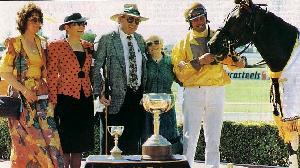 |
| The Cup Winner & Connections |
John Langdon recalled one of his first trips to Addington was on a Cup Cay he should have been at school. He 'bunked' the day in 1962 he saw Lordship win in the wet and stayed at the top of the straight in case he was spotted.
One of those who used to enjoy his company at those race meetings was Harry Webber, no relation of the owners who now race the wonderful young pacer, Neroship. And those old days of youthful escapades became fresh memories as Langdon brought Neroship home in the face of desperate late challenges at the end of Tuesday's DB Draught NZ Cup.
Langdon is no freshman when it comes to the big-time.
His past showcase of metropolitan victories include an Auckland Cup (Neroship), an Inter-Dominion Championship (Young Quinn), and Inter-Dominion Trotters' Championship (Castleton's Pride), a Rowe Cup (Landora's Pride) and a Dominion Handicap with the same mare. But he has trained only one previous winner on the track, and that was King Alba in 1984.
He thought it was to be another grim reminder of past hopes and failed chances when William Dee didn't do what he should have in the main trot, but when Letterkenny Lad pulled a big one out of the box to give him his second training success on the track. He was quite happy to fit No.13 on Neroship.
Langdon received a choice path through over the first half mile, setting him up for a nice run in touch with the pace. "I envisaged a run such as that happening," he said. "All those drawn in were good beginners and I could see myself getting through as long as my horse began well. I didn't really want the front, but when I got there I was entitled to be left alone. The problem I had was near the quarter when he picked up the steel. I thought I'd blown it near the end, because I really would have liked to have held him up a little longer."
But the tide was washing Langdon's way, and there was still comfort at the end, as Starship fell half a length shy at the end.
Langdon is 43. He was born in Christchurch went to Burnside High School, played football with the writer when it was popular to trail forever, and left school to work in the accounts office of the Ministry of Works. All along, he hoped for a job in a stable, and he pestered the late Ces Donald to find a place for him. He couldn't. "I went round just about every stable in Christchurch. Then I went back to Ces to see if he would take me on," he said. Donald did, and gave Langdon the opportunity he has taken so brilliantly.
With horses such as King Hal, Chief Command, Indecision, Chaman and Cairnbrae, Langdon soon got the feel for good horses. And then came the move that really set him apart from trainers and trainers who are a bit special.
He joined up with Charlie Hunter, whose influence on his career was priceless. "He helped me tremendously. When he went export, he gave me the horses to train. Everyone's got to have help at some stage," he said.
Young Quinn was his major success, notable because he was so young, but he rates the win by Neroship as something just as special. "The big thing is that we bought him out of the sale, watched him develop and then do the job," he said.
The earnings of Neroship are now just short of $800,000, the result of 56 starts, 17 wins and 20 seconds and thirds.
Credit: Mike Grainger writitng in HR Weekly
YEAR: 1990
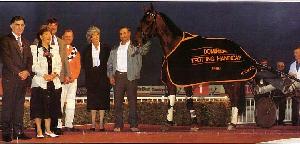 |
| The presentation to the connections of Sundon |
Seldom has so much joy and merriment been punctured so suddenly than in the seconds of satisfaction following the Dominion Handicap. A large crowd, comforted by a warm pleasant night, had relished the return to form of Sundon in the Met's big trot. This was the very moment they had been waiting for ... the young champ back on his pedestal. Cheers laid dormant for months echoed around the course as the big bay put the cap on quality with a dashing front-running exhibition to beat southerner Game Paul and northerner William Dee. The clapping and calling started half-way down th straight when it was apparent this was Sundon's day. There was a great bubble of gaiety at the result until the siren blew it for six.
Cheers turned to out-cry of boos and confusion as word came out that the inquiry was into the winner. Clutching his notes, Metropolitan President Peter Andrews stood uncertainly in the birdcage wings as the drama unfolded. Driver Peter Jones headed for the stipes' room with the comment: "Do you know what this is about?" An emergency huddle of club officials made fresh plans for the presentation and sent Sundon off to the stalls. In the meantime, trainer Fred Fletcher stood in the shadows, bemused by the whole affair. Fay, his wife, wearing her lucky pearls, was more forthright in her opinion of the inquiry. Said Fletcher: "It's my luck lately ... and it's their right."
The inquiry was held into an incident about 350 metres from the start when Marcol's Pride and Gee Du Jour broke. The stipes went to consider whether Jones had crossed with Sundon too close and interfered with them. Tommy Knowles, the driver of Marcol's Pride, and Simon Adlam, who handled Gee Du Jour, gave evidence, the inquiry was dismissed, and Jones came out to say: "It was totally uncalled for. You usually know if you've done something. I was totally bewildered by this."
Jones paid Fletcher a tribute for the manner in which he had prepared the horse. "Fred's done a marvellous job with him. My main worry was getting him away from the second line, though Fred said it would suit him. He felt really strong all the way. I was pretty confident three from home when he pricked his ears," he said.
News of the dismissal met with instant approval and a revival of the cheers that the siren had snuffed out. Sundon was called back, decorated, and the crowd appeased, filed back to their seats. Fletcher has gone through some traumatic times with Sundon in recent months, the latest an accusation that he did not drive the horse on it's merits less than a fortnight back. Fletcher has since appealed against the suspension this charge brought, but he elected to sit the Dominion out. He engaged Jones, who has been driving members of his team with good success already this season. Fletcher had, in fact, suggested to Jones earlier this season that the Sundon drive was available if he wanted it, but a firm decision this was was not made until his recent bad news. "He's not the easiest horse to handle, but he drew what he wanted. He's got no problems and I see a lot of improvement in him yet. I don't think he's actually five until next year some time," said Fletcher.
Fletcher did not attach any extra significance to the Domininion, as he may have done for a stake of such an important race. "I said to Fay on the way in, it would be nice to win, but it is just another race." Sundon, who will now have a week off, is an easy horse to train. "He is the most placid horse I've ever had. He sleeps most of the time," said Fletcher.
Sundon won the race in 4:12.8, which was more than four seconds slower than it took Tobago - one of Saturday night's faders - to win the race last year. An excellent front runner, Sundon was in good hands. Jones took him through the first mile in 2:09.5, sharpened up near the end of that section when Tobago hurried forward to put himself in the call. It was a lonely trip and he sat parked and tired. Jones was able to back off from the mile to the half, which took 64 seconds. He was then in the choice position of being able to sprint at will from there which Sundon did with ease.
To the tune of cheers, siren, boos and cheers, the sun went down on another Dominion Handicap; one that started with drama and ended the same way.
Credit: Mike Grainger writing in HR Weekly
| << PREVIOUS | 1 2 3 4 5 6 7 8 9 10 11 12 13 14 15 16 17 18 19 20 21 22 23 24 25 26 27 28 29 30 31 32 33 34 35 36 37 38 39 40 41 42 43 44 45 | NEXT >> |